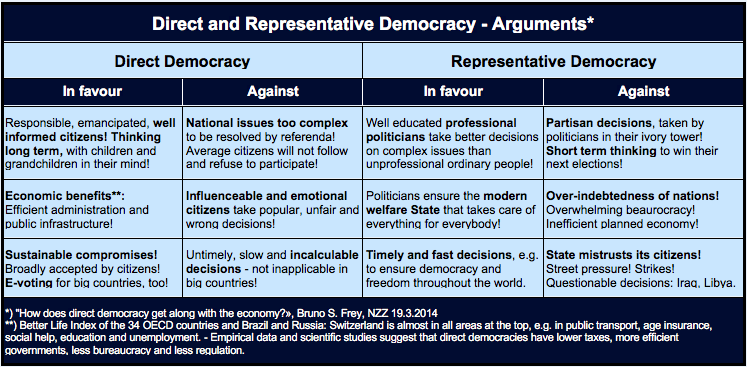
Democracy-Federalism-Subsidiarity
Brussels, Member Countries, Citizens
A. Federalism
Federalism is fundamental for the preservation of the cultural, linguistic and political diversity of European countries and peoples. The independence of member countries can thus be preserved (confederation).
In the federal state (federation), the member states still also have a certain autonomy; while in the unitary or central state, state authority is exercised centrally over the entire state territory from the capital.
B. Subsidiarity
The subsidiarity principle dictates that at the European level only be regulated what is absolutely necessary (also in the context of globalization), but not what member countries and their regions can do themselves as well or even better and often more effectively than "Brussels".
Local, regional and national authorities are closer to the citizens and familiar with local conditions. Their solutions are often better accepted, more efficient and effective and better suited to protect minorities and cultural, linguistic and political peculiarities than EU regulations.
C. Direct and Parliamentary Democracy
In a more directly democratic Europe close to its citizens, the citizens – and not the politicians - have the first word (e.g. with a constitutional initiative) and also the final word (e.g. with legislative referenda) on all important political issues.
This does not mean that in such a Europe government and parliament have nothing to say any more; but they will be forced to work – much more than now – with and for the people - since:
..They will not only be constantly supervised by their citizens, but also sanctioned directly in referenda, if and when necessary - and this not only indirectly, once every five years, when the EU parliament is elected.
The representatives of the citizens will have to keep the promises made in the election campaign. With referenda, the parliamentary (or representative) democracy will become much more representative.
D. Protection of Minorities
Direct democracy (especially because of possible 51% against 49% votes) has to be adjusted and minorities have to be constitutionally protected to avoid a dictatorship of the majority.
The majority grants more rights to the minority, than it claims for itself. Direct democracy therefore is supplemented and tempered by subsidiarity and some important elements of representative democracy and thus becomes a semi-direct democracy:
1. Government and parliament (and not the initiators!) are legally bound to assess all the popular initiatives, to express their view in the referendum campaign and to implement the people's decision.
2. In a bicameral parliament, a small country has the same weight in the senate (chamber of states) as a big one.
3. Proportional elections guarantee that minorities, too, are represented relative to their strength in parliament and in the government, so that parliament and government assess the popular initiatives in a better balanced way prior to the referendum, and that an inevitably often undifferentiated yes/no decision in a referendum is implemented more cautiously, involving the minorities.
4. A quorum that has to be achieved for a popular referendum to be adopted, prevents 51% to 49% decisions.
5. In a referendum requiring a double majority (of both voters and of states), the citizens of a small country have a bigger weight per capita than citizens of a big country.
6. A Constitutional Court may cancel a referendum or a decision of parliament (under certain conditions).
E. Democracy, Federalism and Subsidiarity in the EU
In the European Union, of course, everybody, in principle, wants more democracy and subsidiarity: EU politicians, authorities and elites time and again declare to be in favour of more citizens' participation and subsidiarity, and also in favour of a reduction of bureaucracy.
*) Definitions
1. Democracy (cf. Wikipedia)
From the Greek "rule of the people": A form of government in which eligible citizens may participate equally - either directly by
voting for the passing/rejecting of laws or running for office themselves (direct democracy) or indirectly through elected representatives (indirect or representative democracy) -
in the proposal, development and establishment of the laws by which their society is run. Or more simply:
-
Parliamentary or representative democracy:
The final word goes to parliament. - Direct democracy: The final word goes to the citizens.
Max Frisch: "Democracy means to interfere in one's own
affairs".
Johann Wolfgang von Goethe: The best Government is the one "that
teaches us to govern us ourselves".
2. Federalism (several definitions):
The Free Dictionary: A union of states under a central government (federation) distinct from that of separate states, who retain certain individual powers under the central government (confederation).
Vocabulary.com: Federalism is a system of government in which entities such as states or provinces share power with a national government (e.g. USA).
Wikipedia: A Confederation (Latin confoederatio "Alliance") is a union of sovereign states. In the unitary or central state, state power is generally exercised centrally throughout the entire state from the capital.
3. Subsidiarity
Wikipedia: Principle of social organizations, which holds that problems should be dealt with at the most immediate (or local) level consistent with their solution.
A central authority should have a subsidiary (that is, a supporting, rather than a subordinate) function, performing only those tasks, which cannot be performed effectively at a more immediate or local level. The responsibility lies with the smallest entity capable to solve the problems.
Art. 5.3 of the Treaty on the EU:
"Under the principle of subsidiarity, in areas which do not fall within its exclusive competence, the Union shall act only if and in so far as the objectives of the proposed action cannot be sufficiently achieved by the Member States, either at central level or at regional and local level, but can rather, by reason of the scale or effects of the proposed action, be better achieved at Union level."

